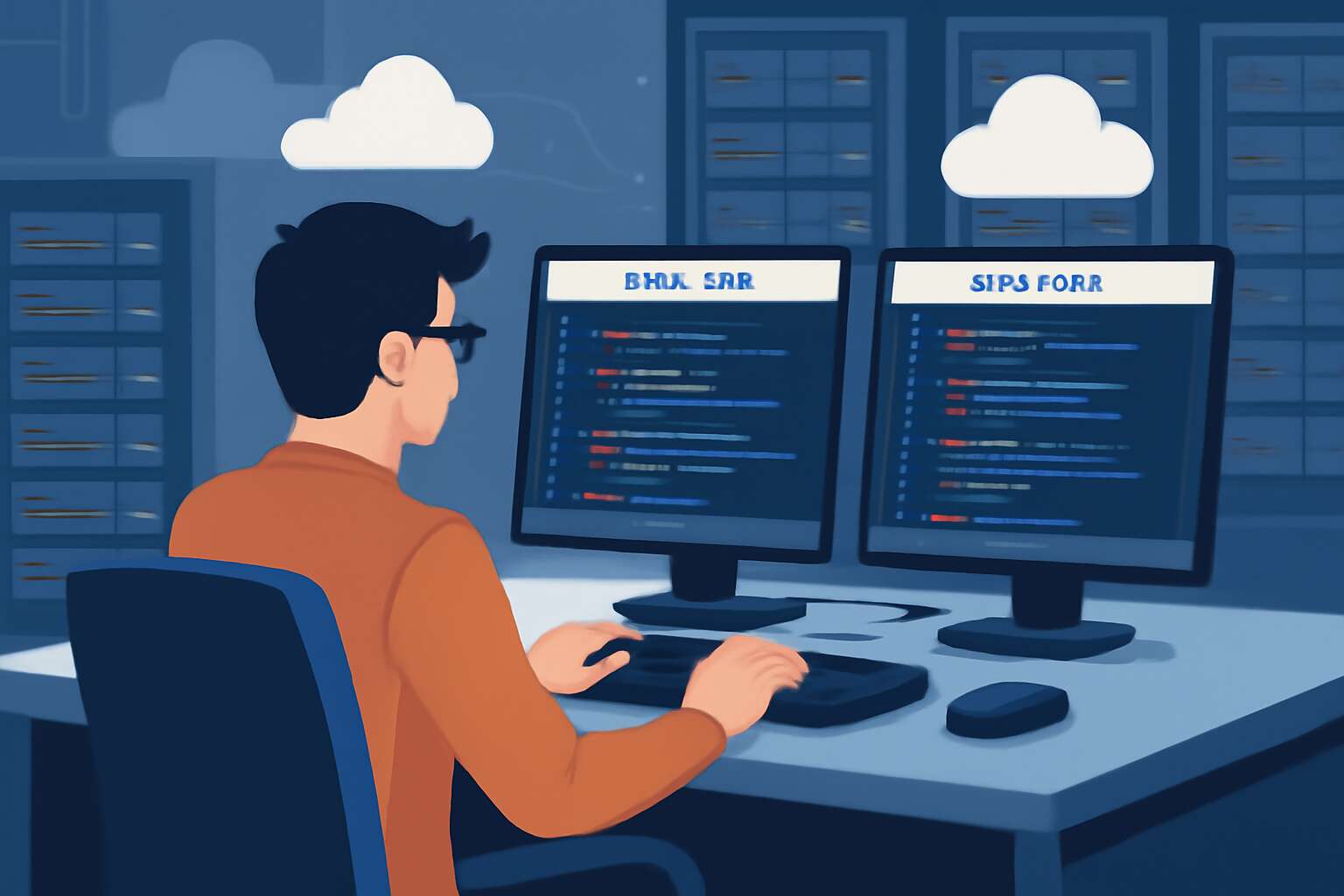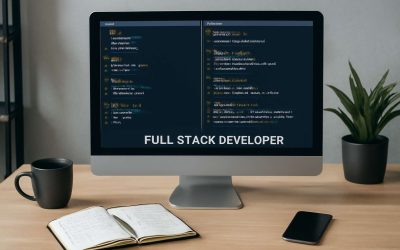Understanding the Roles in Modern Software Development
Overview of a Full Stack Developer
In the grand theatre of modern software development, understanding the roles of a full stack developer vs devops engineer is akin to knowing whether you need a Swiss Army knife or a master conductor. A full stack developer is the ultimate multitasker—juggling front-end flair with back-end backbone, often single-handedly crafting entire applications from user interface to server-side logic. It’s a role that demands versatility and a dash of daring, making them the go-to for startups craving agility and speed.
Meanwhile, the devops engineer is more like the backstage wizard, ensuring the show runs smoothly behind the curtains. They bridge the gap between development and operations, orchestrating continuous integration, deployment, and system stability. It’s a demanding role that requires a keen eye for automation and an uncanny ability to troubleshoot the unmentionable gremlins lurking in deployment pipelines.
- Developers focus on building features that dazzle users.
- Devops engineers streamline those features into seamless, reliable releases.
Whether you’re pondering the full stack developer vs devops engineer debate, remember: both roles are vital cogs in the digital machinery, each with its own flavour of expertise—and neither can be easily replaced by a robot! After all, one crafts the experience, while the other keeps the machinery humming quietly in the background.
Overview of a DevOps Engineer
In the intricate realm of modern software development, the role of a DevOps engineer emerges as a vital force, shaping the very backbone of seamless digital experiences. Unlike traditional developers who focus primarily on crafting features, DevOps engineers embody a philosophical shift—viewing software as a living organism that requires careful orchestration, continuous nurturing, and resilient infrastructure. Their purpose extends beyond mere code; they are the custodians of stability, security, and scalability.
At its core, a DevOps engineer’s responsibilities include automating deployment pipelines, managing cloud infrastructure, and ensuring system reliability. This role demands a unique blend of technical mastery and strategic vision, often expressed through tools like CI/CD pipelines, containerisation, and monitoring systems. For those exploring the full stack developer vs devops engineer debate, understanding these subtleties illuminates why the latter is the unsung hero behind the scenes.
- Automating workflows to reduce manual intervention.
- Monitoring system health and pre-emptively resolving issues.
- Implementing security protocols to safeguard data integrity.
In essence, DevOps engineers are the architects of operational harmony, turning chaos into order with an almost poetic precision. Their work ensures that the innovative features built by full stack developers reach users smoothly, securely, and reliably—an indispensable counterbalance in today’s fast-paced tech landscape.
Core Responsibilities and Skills
Key Skills of a Full Stack Developer
In the labyrinth of modern software development, understanding the core responsibilities of a full stack developer reveals a fascinating blend of artistry and technical mastery. These professionals are the bridge builders, seamlessly integrating front-end interfaces with robust back-end systems. Their skills stretch across multiple domains, making them versatile problem-solvers who thrive in dynamic environments.
Key skills of a full stack developer include proficiency in languages like JavaScript, Python, and SQL, along with a keen eye for UI/UX design and database management. They are often tasked with rapid prototyping and iterative testing, ensuring that user experience and functionality align harmoniously. When pondering the differences between a full stack developer vs devops engineer, it becomes clear that while the former focuses on creating and maintaining applications, the latter orchestrates the deployment pipeline, ensuring stability and scalability at a systemic level.
What truly sets a full stack developer apart is their adaptability—a trait that demands continuous learning and a deep understanding of both client-side and server-side intricacies. Their role is a constant balancing act, where technical prowess must be paired with an intuitive grasp of end-user needs. It’s this depth of expertise that makes them indispensable in the ongoing quest for software excellence.
Key Skills of a DevOps Engineer
In the hidden corridors of modern software infrastructure, DevOps engineers are the vigilant orchestrators of stability, embodying a blend of automation mastery and systemic oversight. Their core responsibilities revolve around streamlining development workflows, automating deployment pipelines, and ensuring continuous integration and delivery. This role demands a keen eye for system architecture and a deep understanding of cloud platforms, containerisation, and monitoring tools. It’s a delicate dance—balancing rapid deployment with unwavering system resilience.
Key skills of a DevOps engineer include proficiency in scripting languages like Bash, Python, or Ruby, alongside expertise in tools such as Jenkins, Docker, and Kubernetes. They are often tasked with designing efficient CI/CD pipelines, which can be broken down into several critical steps:
- Automating code integration and testing
- Managing infrastructure as code with tools like Terraform or Ansible
- Monitoring system health and responding swiftly to anomalies
Unlike the full stack developer vs devops engineer debate that often highlights contrasting focuses, DevOps engineers operate behind the scenes, ensuring that the application ecosystem remains resilient and scalable in the face of constant change. Their role is akin to the unseen conductor, maintaining harmony across complex systems while the application itself continues to evolve and adapt seamlessly. It’s a role that demands not just technical prowess but an almost instinctive sense of systemic rhythm—an essential component in the modern software symphony.
Tools and Technologies Used
Popular Technologies for Full Stack Developers
In the realm of modern software craftsmanship, tools and technologies serve as the enchanted instruments that bring visions to life. For full stack developers, mastery over a diverse set of technologies transforms their role into that of a digital wizard. From crafting seamless user interfaces to building robust backend architectures, their toolkit is both versatile and powerful.
Popular technologies for full stack developers include JavaScript frameworks like React or Angular, server-side languages such as Node.js or Python, and databases like MySQL or MongoDB. These tools enable them to weave complex applications that are both scalable and user-friendly. Interestingly, while full stack developers often juggle multiple frameworks, DevOps engineers focus on a different set of mastery—such as automation tools, CI/CD pipelines, and cloud platforms.
- Docker for containerisation
- Kubernetes for orchestration
- Jenkins or GitLab CI for continuous integration
Both roles require a deep understanding of their respective toolsets, yet their technological landscapes diverge like two paths in a mystical forest—each vital for the kingdom of software development. The full stack developer vs devops engineer comparison reveals not just differences in skills, but a shared commitment to building resilient, efficient systems that power our digital world with wonder and precision.
Popular Tools for DevOps Engineers
In the grand theatre of modern software development, DevOps engineers perform a delicate dance with a set of tools that seem to orchestrate the universe itself. Their mastery lies in automating complex processes, ensuring that deployment pipelines flow seamlessly like a symphony. Among their arsenal are powerful technologies that transform the chaos of development into organised harmony.
Tools such as Docker and Kubernetes stand at the forefront, acting as the architects of containerisation and orchestration. Docker enables DevOps engineers to encapsulate applications in portable containers, ensuring consistency across environments. Kubernetes then takes the baton, managing those containers at scale with finesse, orchestrating clusters that run like well-tuned machinery. For continuous integration and continuous deployment, Jenkins and GitLab CI serve as the heartbeat, automating testing and deployment with relentless precision.
While the full stack developer vs devops engineer comparison often highlights contrasting skill sets, it’s undeniable that both roles rely on an intricate web of technologies. Their collaboration fuels the resilience and agility of digital systems, turning complex visions into tangible realities that shape the future of technology.
Differences in Workflow and Collaboration
Development Cycle of a Full Stack Developer
The workflow and collaboration cycle of a full stack developer versus a devops engineer reveal stark differences in approach and focus. A full stack developer primarily works within the development cycle, juggling front-end and back-end tasks to deliver complete solutions. Their collaboration often involves close communication with designers, product managers, and QA teams to ensure seamless integration of features.
In contrast, a devops engineer’s role centres around streamlining deployment, automation, and system reliability. Their workflow integrates development with operations, often utilising continuous integration and continuous deployment (CI/CD) pipelines. Collaboration here spans across development, IT, and security teams, demanding a holistic view of the entire infrastructure.
To visualise the key distinctions:
- Full stack developers focus on building feature-rich applications, often working in sprint cycles.
- Devops engineers optimise the deployment processes, ensuring rapid, stable releases.
Understanding these differences clarifies why the full stack developer vs devops engineer debate is central to modern software teams — each role plays a vital part in the cycle of creating, deploying, and maintaining software solutions.
Deployment and Operation Workflow of a DevOps Engineer
In the shadowed corridors of software craftsmanship, the workflow of a DevOps engineer unfolds like an intricate dance with the unseen forces of technology. Unlike the full stack developer vs devops engineer debate, which often focuses on distinct skill sets, the operational realm of a devops engineer revolves around orchestrating deployment and maintaining system stability amidst chaos. Their work is a relentless pursuit of automation, where every release is a silent, calculated act of precision.
Deployment and operation workflows are woven into a seamless tapestry of continuous integration and continuous deployment (CI/CD). This orchestration demands a holistic view of infrastructure, security, and the software lifecycle itself. To better understand, consider the following core elements:
- Automated testing and deployment pipelines that ensure rapid, reliable releases
- Monitoring and feedback loops that enable swift response to system anomalies
- Cross-functional collaboration with development, IT, and security teams—each a vital actor in the grand performance
For the devops engineer, the heartbeat of their craft is stability—ensuring that every piece of code flows into the digital ether smoothly, like a ghostly waltz through the darkness. In this eternal dance, the line between development and operations blurs, giving rise to a role that’s as much about orchestration as it is about technical mastery.
Career Paths and Growth Opportunities
Job Market and Opportunities for Full Stack Developers
Career paths in tech are evolving rapidly, and understanding the job market for full stack developers versus DevOps engineers can be crucial for making strategic decisions. Full stack developers, with their versatile skill set, often find themselves in high demand across startups and established companies alike. Their ability to handle both front-end and back-end tasks makes them highly adaptable, opening doors to roles in product development, software architecture, and leadership positions.
Meanwhile, the demand for DevOps engineers continues to surge, driven by the need for streamlined deployment processes and continuous integration. The market for DevOps professionals is particularly strong in organisations prioritising automation and operational efficiency. For those considering a career in either full stack development or DevOps, growth opportunities are plentiful and often reflect the broader shift towards integrated, agile development and operational practices. In fact, a recent industry report highlights that the job market for both roles is expected to grow significantly in the next five years, with particular emphasis on skills like cloud computing and automation tools.
Career Progression for DevOps Engineers
Career paths for DevOps engineers are as dynamic as the technology landscape itself. With organisations increasingly prioritising automation and seamless deployment, DevOps professionals find themselves at the heart of digital transformation. Their growth trajectory often involves moving into senior roles such as Lead DevOps Engineer or Cloud Architect, where strategic oversight becomes key. The scope for specialisation is vast—many choose to deepen expertise in areas like container orchestration, security, or cloud infrastructure.
Moreover, the progression isn’t limited to technical depth; leadership opportunities abound. As DevOps practices become embedded in organisational culture, seasoned engineers frequently transition into roles such as DevOps Managers or CTOs, shaping company-wide operational strategies. For those seeking a structured career ladder, an understanding of the key skills required for DevOps engineers—like automation, scripting, and cloud platforms—is essential. Whether climbing the ladder or specialising further, their growth opportunities remain promising in today’s evolving tech ecosystem.
Challenges Faced by Each Role
Common Challenges for Full Stack Developers
Balancing the demands of a full stack developer vs devops engineer role isn’t a walk in the park. Full stack developers often face the challenge of wearing multiple hats—front-end, back-end, and everything in between—sometimes feeling like a one-person circus act. Juggling these diverse responsibilities can lead to burnout and a tendency to spread themselves too thin. Meanwhile, devops engineers grapple with the complex dance of integrating development and operations, ensuring seamless deployment pipelines, and managing infrastructure at scale. When things go awry, troubleshooting can feel like trying to find a needle in a haystack, especially under tight deadlines.
One common challenge shared by both roles is keeping pace with rapid technological changes. For a full stack developer vs devops engineer, staying current with new frameworks, tools, or cloud services can seem like chasing a moving target. Additionally, the pressure to deliver reliable, scalable solutions while maintaining security standards adds an extra layer of complexity. Whether it’s managing cross-functional expectations or handling unexpected outages, these roles demand resilience, adaptability, and a good sense of humour—because sometimes, tech problems just refuse to cooperate.
Common Challenges for DevOps Engineers
Amidst the relentless tide of technological evolution, the role of a devops engineer confronts unique and intricate challenges that test resilience and ingenuity. Unlike their full stack developer vs devops engineer counterparts, who grapple with coding and design, devops engineers are caught in an ongoing balancing act of integrating development and operations seamlessly. Managing complex deployment pipelines and infrastructure at scale demands a mastery of both automation and orchestration, often under the pressure of tight deadlines. Troubleshooting issues that span multiple layers of the tech stack can feel like searching for a ghost—elusive and frustrating.
The unpredictability of system failures adds another layer of complexity, requiring not only technical acumen but also a resilient mindset. For devops engineers, staying ahead of the curve involves constantly adapting to rapid shifts in cloud technologies and infrastructure-as-code paradigms. The dual challenge of maintaining operational stability while innovating at pace often leads to fatigue.
- Volume of data and logs to sift through
- Keeping security measures up-to-date amidst evolving threats
- Managing cross-team collaboration in a fast-moving environment
These obstacles underscore the importance of agility and a cool head, especially when every second counts in the race against system downtime.
Which Role Suits Your Career Goals?
When to Choose a Full Stack Developer Path
In the shadowed corridors of technology, choosing the right path can feel akin to navigating a labyrinth of ambiguity. When contemplating whether to pursue a career as a full stack developer vs devops engineer, it’s essential to align your ambitions with the inherent nature of each role. If your soul craves versatility, where coding, designing, and managing the entire application stack beckon, the full stack developer path offers a tantalising blend of creativity and technical mastery. This role is perfect for those who wish to wield both front-end finesse and back-end prowess, crafting seamless digital experiences from the ground up.
In contrast, the devops engineer’s realm is woven with the dark art of continuous integration, automation, and infrastructure mastery. If orchestrating deployment pipelines and ensuring the relentless pulse of software delivery energises you, then this role might be your calling. The choice ultimately hinges on your career goals: do you desire to be the jack-of-all-trades in application development, or the sentinel guarding the swift and silent flow of deployment? The answer lies in your own appetite for breadth versus depth, as the landscape of full stack developer vs devops engineer continues to evolve with relentless fervour.
When to Transition into DevOps Engineering
Deciding which role aligns with your career ambitions can feel like choosing between a panoramic vista and a deep, mysterious cave. The full stack developer vs devops engineer dilemma is not merely about skill sets but about the landscape you wish to explore. Do you yearn for a broad horizon, where your fingers dance across the front-end and back-end with equal finesse? Or does the thought of orchestrating automated pipelines and safeguarding the heartbeat of deployment excite your soul?
Often, the transition into a devops engineer role is driven by a desire for mastery over the infrastructure, automation, and continuous integration processes that keep the digital world spinning seamlessly. If you find yourself craving a shift from code creation to system orchestration, it might be time to consider a move. Reflect on your core passions and career goals—whether they lean towards breadth or depth—and recognise that the journey from full stack developer to devops engineer is a natural evolution for many in the tech realm.
- If your enthusiasm lies in honing infrastructure mastery and automating complex workflows, stepping into a devops engineer role offers a compelling new vista.
- Conversely, if your drive is to craft end-to-end applications and wield diverse technical skills, deepening your expertise as a full stack developer remains a rewarding pursuit.
Ultimately, the choice hinges on your appetite for technical breadth versus specialised depth—each path offering its own unique odyssey within the ever-evolving landscape of full stack developer vs devops engineer.
Future Trends and Industry Outlook
Evolution of Full Stack Development
In the shadowy corridors of technological evolution, the future of full stack development whispers of an inevitable convergence with DevOps engineering. As automation and artificial intelligence seep deeper into the backbone of software creation, the boundaries separating these roles blur, unveiling a landscape where versatility reigns supreme. The industry anticipates a shift — a renaissance — driven by the need for seamless integration of development and operational workflows.
Emerging trends suggest that full stack developer vs devops engineer roles will increasingly intertwine, demanding professionals to master both realms. The ascent of containerisation, continuous deployment, and cloud-native architectures fuels this transformation. It’s a dance of adaptability, where specialists must evolve into polymaths, capable of orchestrating the entire symphony of software craftsmanship. This evolution hints at a future where hybrid skills become the new currency, and the once-clear demarcations fade into a murky, yet promising horizon.
Emerging Trends in DevOps
As the digital landscape morphs into a shadowy theatre of perpetual innovation, the lines between full stack developer vs devops engineer are blurring with an ominous grace. Emerging trends in DevOps whisper of a future where automation and artificial intelligence become the spectral puppeteers behind seamless deployment and operational harmony. The industry’s pulse quickens with the realisation that versatility is no longer optional but essential for survival in this evolving theatre of technology.
Within this darkened horizon, hybrid roles are rising from the ashes, demanding a rare fusion of skills. The rise of containerisation, continuous deployment, and cloud-native architectures acts as a catalyst, transforming the traditional boundaries into a murky continuum. Professionals who dare to navigate both worlds will find themselves wielding an enchanted key — unlocking opportunities that once seemed worlds apart.
- Mastering orchestration of development workflows
- Harnessing automation tools to streamline deployment
- Adapting to ever-changing cloud-native infrastructures
In this twilight era, the debate of full stack developer vs devops engineer is no longer black and white but a spectrum of skills blending into an enchanted tapestry. As the industry’s shadows deepen, those who embrace this convergence will be the architects of the future’s unseen realm of technology, where adaptability reigns supreme and the old boundaries fade into an enigmatic horizon.




0 Comments